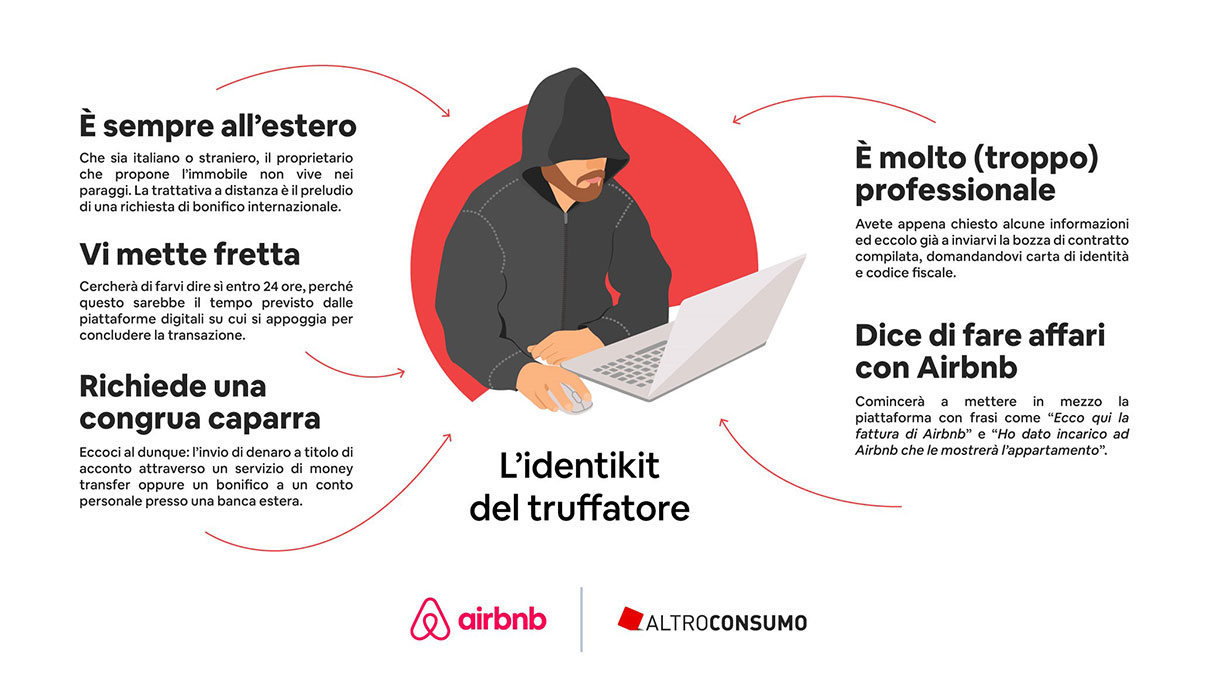The vacations are approaching and like every year the scams of online bookings are around the corner, but we can defend ourselves if we know how to recognize the scammers and avoid their deceptions. For this reason, Altroconsumo and Airbnb have published a guide that explains how to do.
Beware of the site where we are making the reservation: often it is very similar to the original one, so you need to check url and information. It is necessary to analyze with as much care the characteristics of the announcement and be wary of exaggeratedly advantageous prices, too vague text or lack of reviews. Good habits are also to make the payment through the secure platform and not to trust last minute changes.
The identikit of the online scammer
The scammers are usually detected, says Marco Valerio Cervellini of the Postal Police (here the indications on how to avoid scams), but the more time passes and more difficult to recover the money stolen. So, at a time when tourism in Italy is changing face, it is necessary to pay attention to some details of the host that should make us suspicious.
It is always abroad
Whether Italian or foreign, the owner who offers the property invariably does not live nearby. To dispel any doubts, he will give unsolicited explanations about the business reasons that led him to move. The long-distance negotiation is the prelude to a request for an international transfer.
He is too professional
You have just asked for some information and here he is already sending you a draft of the contract. He asks for your identity card and tax code, preferably with a photo. What appears to be a serious way of doing things is actually the prelude to identity theft.
He'll rush you
He'll try to get you to say yes within 24 hours. Passing himself off as a busy professional, he will imply that he has no time to waste, because that would be the time provided by the digital platforms he relies on to conclude the transaction. His messages will become insistent.
He says he's doing business with Airbnb
To reassure the victim, he'll start putting the platform in the middle. Frasi come: “Ecco qui la fattura di Airbnb”, “ho dato incarico ad Airbnb che le mostrerà l’appartamento”, “Presenterò io ad Airbnb i suoi documenti” sono tutti indizi se non prove del tentativo di raggiro.
Richiede una congrua caparra
Eccoci al dunque: l’invio di denaro a titolo di acconto attraverso un servizio di money transfer oppure un bonifico a un conto personale presso una banca estera. Con la promessa di restituire la somma se l’affare non dovesse andare in porto.

Cosa fare in caso di truffa
La prima cosa da fare in caso di truffa è segnalare immediatamente. Spesso i truffatori chiedono il pagamento su conti legate a carte ricaricabili e, dopo la transazione la svuotano il più presto possibile. In questo modo, anche quando la Polizia Postale li individuerà, sarà molto difficile recuperare il denaro sottratto. The sooner you intervene, the more chances there are to recover the money.
